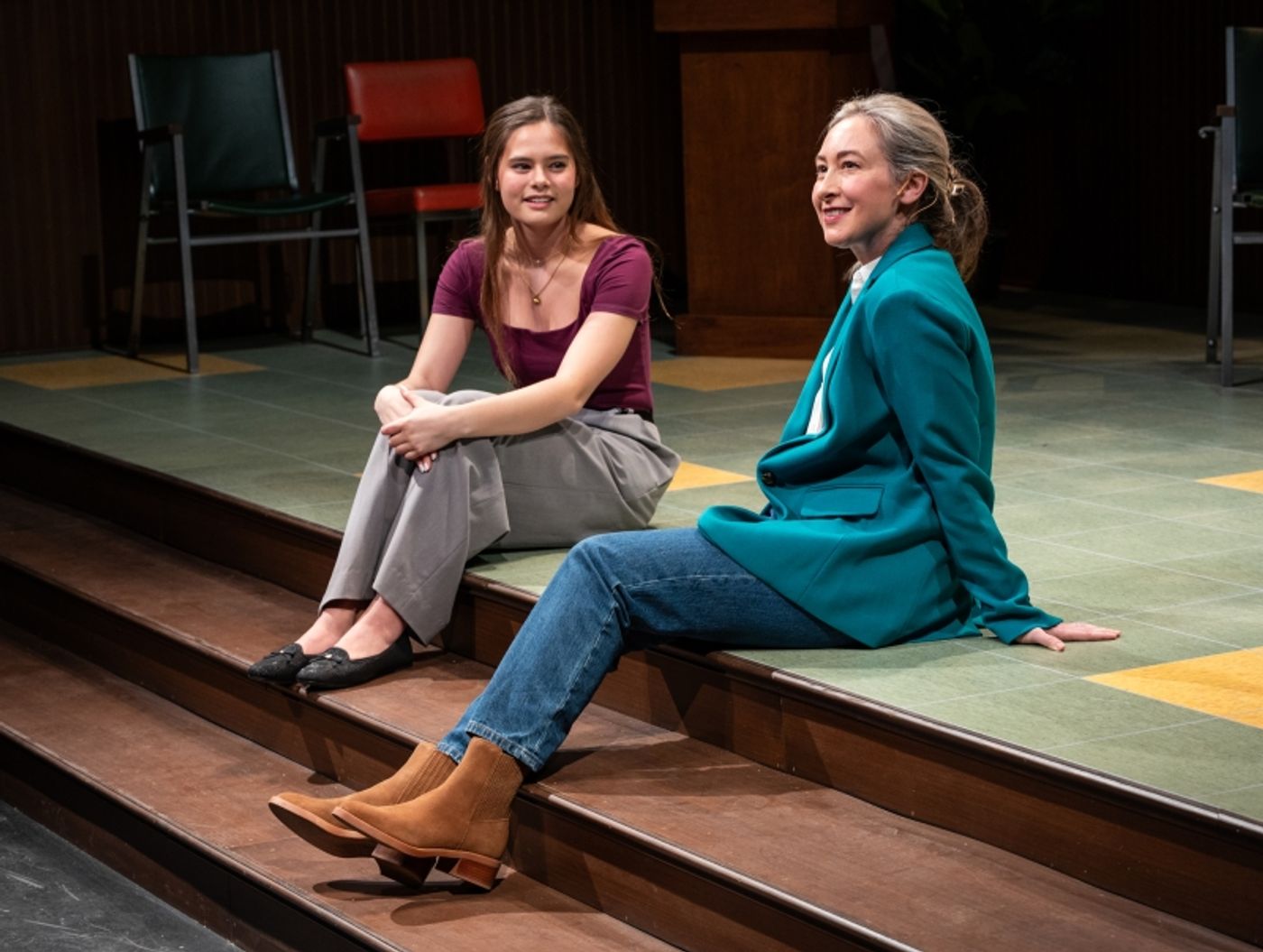Review: WHAT THE CONSTITUTION MEANS TO ME at Milwaukee Repertory Theater Brings Historic Text to Modern Life
Witty, honest, and deep, this play brings a refreshing perspective on one of the most important texts in United States history

It was a Friday night when I picked up my friend, a fellow local legal aid lawyer, and drove over to the Milwaukee Rep to see a play whose plot I was largely unfamiliar with. She knew of the Pulitzer Prize Finalist show, but all I knew was the title of the play. Still, I figured the show would especially resonate with me, given its title: What the Constitution Means to Me, by Heidi Schreck.
“What does the Constitution mean to me?”, I thought on the drive over. I saw my seven-year-old self underneath the big etched words of our Supreme Court, “Equal justice under law”, the words part-mystery, part-deeply resonate with me. I thought back to my Constitutional Law classes, where we intimately studied the architecture of the Constitution and the American tradition of constitutional interpretation through judicial review. I recalled filing motions on behalf of incarcerated individuals, arguing that they deserved a new day in court due to ineffective assistance of counsel, a 6th Amendment issue. I thought about various community marches and rallies I’ve participated in; I thought about the ways in which this historic text has touched the lives of those I love. I didn’t know what to expect from the play, but my ever-growing love and support of theater had me excited, giddy, and dare I say...nervous? The next few hours at the theater turned out to be more than I could have anticipated: laughs (many), heartbreak (few, but deep), and what may be one of the most patriotic acts to bear witness to: a woman telling her story.
Directed by Laura Braza, What the Constitution Means to Me features Jessie Fisher as Heidi, who as a teenager traveled the United States competing in various Constitutional debates hosted by the American Legion, earning her enough money to cover her college tuition. In the play, Heidi revisits her fifteen-year-old self during one of these competitions as an endearing and overly exuberant competitor, likening the Constitution to a crucible; the document, a spell of text after having survived heated debates. Heidi toggles between her younger identity and her current perspective of an adult woman in her forties, reflecting on how her life and the lives of three generations of women before her have been shaped by protections afforded (or not afforded) by the Constitution. More specifically, she dissects her ancestors’ rights to citizenship, voting, privacy and, protection from intimate partner violence.
.jpg?format=auto&width=1400)
As part of this reflection, Heidi introduces the audience to Castle Rock v. Gonzalez, a 2005 U.S. Supreme Court case involving a woman who pleaded multiple times with her local police department to enforce a restraining order after her abusive husband violated the order. After being ignored by police, her husband kidnapped their three young daughters and shot them to death. Jessica Gonzalez sued the police department for failing to enforce her husband’s restraining order, pointing to the controlling legislation that stated the police “shall” make an arrest under these circumstances. Heidi then directs the audience to an audio clip that plays overhead, thanks to sound design by Victoria Deiorio. The clip involves several male Justices arguing over the meaning of the word “shall” as it relates to the case—a poignant, funny only in its absurdity, and gut-punching moment of the show. Ultimately, the Court decided that the meaning of “shall” was more akin to “may” than to “must”, and it ruled that the police had no duty to make an arrest; they found that no constitutionally protected right to police existed for Jessica Gonzalez. The audience is left to question whether the Constitution failed to protect Jessica Gonzalez and her three kids, Heidi and her previous generations of ancestors, and we the people, at large.
Heidi is joined by Legionnaire/Danny (Will Mobley), who switches between the role of competition moderator and friend to current-aged Heidi. In one scene, Danny recalls a memory of his youth football coach using a sports analogy that was marred by violent (and gendered) language, contributing to a culture of antipathy around the issue of violence against women. Danny also recalls a time when he cried on the field after his team lost, and his father’s response was to hold him and let him cry, instead of embodying his then-coach's “men shouldn’t be vulnerable” stance. The difference in each man’s approach was startling, and confusing for young Danny. Danny’s memories, when juxtaposed with Heidi’s stories, offer an interesting insight into how traditional gender norms can have a damaging effect on all, regardless of identity.

Photo by Michael Brosilow.
![]()
The story really takes center stage in this play, with a brilliantly minimalist set designed by Collete Pollard, featuring a simple stage with some chairs that look like they haven’t been replaced since the ‘70s, a table draping Civil War Era American flags in the “bunting” style (think half-circle pleated flags), and a simple wooden podium. Framing this scene is a backdrop of military relics, American flags, and photos of (assumed) decorated veterans, recalling childhood U.S. history books or a visit to a Veteran’s Museum.
Also featured in the play is a school-aged Debater, played by Maria (Rose) Campbell, Hazel Dye, or May O’Day-Biddle, rotating for each show run. To conclude the show, Heidi and the Debator participate in a mini debate which gives the audience an insight into how a small part of the competition, uninterrupted, might run. More than this, the debate scene provides intimate access into how the topic of the Constitution is understood by emerging adults, with all its significance, flaws, protections, and exclusions (the play reminds us that it took until the 19th Amendment to add "women" to the group of citizens given the right to vote). This perspective is particularly relevant given our presidential election year.

Photo by Michael Browsilow.
Sitting in the Stiemke Studio black box theater, my friend and I were reminded of how live, local theater can take you outside of yourself for a trip through someone else’s story, only to return you right back to yourself with an expanded capacity to think, reflect, and perhaps, to love, to forgive, to persevere. An unexpected high point of the show was a voice recording of the late Justice Ruth Bader Ginsburg. The audio clip captured her reflections on the lack of women representation on the highest court in our land.
In her commentary, the late Justice remarks that when she was college-aged, women were rarely hired into judges’ chambers, “strictly forbidden” in some spaces, and largely not given access to the room where it happens. The excuse at the time was that women weren’t up to dealing with the “tough types” of people that these offices work with and represent. Her response to this is “…I was amazed. I said, have you seen the lawyers at legal aid who are representing these tough types? They’re all women.”
Progress has been made a pendulum, an arc that bends toward justice, and in this play, thanks to an analogy offered by Heidi's mother, a woman walking with her dog down a beach. As they journey together, the dog "keeps running ahead and then running backwards, so that if you only keep your eye on the dog it seems like progress is constantly being undone", Heidi shares. "But if you watch the woman, you can she she is steadily moving forward and forward and forward."
What the Constitution Means to Me runs until March 17, 2024, in Milwaukee Rep’s Stiemke Studio, after extending its run due to high ticket demand.
Photo credit: Michael Brosilow
Reader Reviews
Videos

